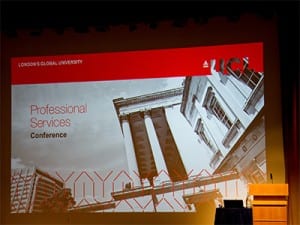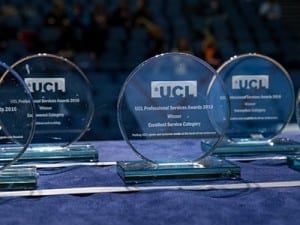UCL Professional Services Conference 2016
By ucyow3c, on 2 February 2016
![]() Written by Sonia Abrams (UCL Communications and Marketing)
Written by Sonia Abrams (UCL Communications and Marketing)
 More than 800 staff were in attendance at the second UCL Professional Services Conference, which took place on Tuesday 2 February at Logan Hall. The event was an opportunity to celebrate the achievements of the professional services community at UCL in a relaxed environment that also provided time to network, receive up-to-date information and socialise at the post conference reception.
More than 800 staff were in attendance at the second UCL Professional Services Conference, which took place on Tuesday 2 February at Logan Hall. The event was an opportunity to celebrate the achievements of the professional services community at UCL in a relaxed environment that also provided time to network, receive up-to-date information and socialise at the post conference reception.
The afternoon consisted of a series of presentations followed by an awards ceremony for staff and teams nominated for Professional Services Awards by their colleagues across the university, as well as a Q&A with UCL President & Provost, Professor Michael Arthur.
Rex Knight, Vice-Provost (Operations) opened the conference with a short introduction reminding staff of the key highlights for UCL over the past couple of years. This included the merger with the Institute of Education, as well as the outstanding REF result “which has taken us right to the top of the UK league tables on many measures, ahead of Oxford and Cambridge”. Knight thanked professional services staff for their contributions to these results by acknowledging “the support that is given to research activity through the institution”. He also eluded to the forthcoming philanthropic campaign being the most ambitious to date for UCL, and even in Europe.
There was then a presentation from Dr Steve Rowett (UCL Information Services Division) on technology to support the connected curriculum, and Simon Cane, Director of UCL Public and Cultural Engagement (PACE), spoke about developing a new museum service at UCL East. Ben Meunier (UCL Library Services) presented a film about delivering the UCL Library Services 2015–18 key performance area, which focuses on training, equality and diversity, recruitment and training, as well as quality assurance, and Suzy Wright (UCL Estates) spoke about the outcomes and next steps for agile working.
Hive of activity
Staff were then invited to explore the marketplace where colleagues showcased collaborative and cross-faculty projects that are helping UCL achieve its goals. The room was a hive of activity and colleagues from various faculties had the opportunity to network and hear more about each other’s projects. The final presentation came from Lina Kamenova and Sinéad Dennehy (UCL Student and Registry Services), who shared a collaborative project to assist with the pre-arrival induction of new students via UCL Newsfeed.
It was then time for the winners of the Professional Services Awards 2016 to be announced. The awards consisted of five categories with nominations coming from a diverse range of staff across the university. The Health Creatives team, led by Jayne Noctor, won the ‘Empowered… confident and enabling’ award for their innovative projects. These projects have involved providing much needed web and mobile application services, and have received a number of accolades at the 2015 Institute of Medical Illustrators Annual Conference.
 The winner of the ‘Excellent service… putting UCL’s goals and customer needs at the heart of our endeavour’ award was UCL Library Services, Main and Science daytime and Evening/Saturday teams, led by Breege Whiten. Since the introduction of self-service in the UCL Main and Science Libraries, the front-line teams have transformed their services to deliver a wider range of support – ensuring that they are easily on hand to answer any enquiries. The Evening and Saturday teams also changed their work patterns, and managers introduced formal customer services training and a monthly journal club to discuss best practice.
The winner of the ‘Excellent service… putting UCL’s goals and customer needs at the heart of our endeavour’ award was UCL Library Services, Main and Science daytime and Evening/Saturday teams, led by Breege Whiten. Since the introduction of self-service in the UCL Main and Science Libraries, the front-line teams have transformed their services to deliver a wider range of support – ensuring that they are easily on hand to answer any enquiries. The Evening and Saturday teams also changed their work patterns, and managers introduced formal customer services training and a monthly journal club to discuss best practice.
Taking the award for ‘Innovation… to be creative and ambitious in all our endeavours’ was the UCL Sustainability team, led by Alex Green. The team’s new interactive online tool, degreesofchange.co.uk, has brought issues around reducing the university’s carbon emissions to life, while gathering views from the UCL community in a more participatory and interactive way. Degrees of Change has had enormously positive feedback from students, showing that participants are engaged and sharing insights for UCL’s Carbon Management Plan.
One university, one team
The UCL Public and Cultural Engagement (PACE) Programming team, led by Helen Pike, won the ‘Mutual respect… to maintain an inclusive environment in which all colleagues can flourish’ award. The PACE programming team identified that UCL’s museums had less appeal for those studying unrelated subjects, and therefore devised a new mechanism to engage students from across UCL’s faculties. At the Fresher’s Fair and other start of term activities, they recruited a student panel to design and run events in the museums. The PACE Programming team’s approach was open and inclusive, involving students across UCL, regardless of their experience, and the students gained skills in programme planning, devising content, budgeting and marketing.
The final award, ‘Collaboration… putting UCL’s goals first by working in partnership’, went to the UCL Data Integration team, led by Kirsten Hamilton. The team was established by UCL Student and Registry Services to ensure the identification, implementation and assurance of the work required to deliver UCL’s merger with the Institute of Education. The merger demanded an intensely collaborative approach that was sensitive to cultural differences across the two institutions. The team worked to an extraordinarily ambitious goal of completing an 18–24 month project in nine months, requiring them to work longer than usual hours.
The conference concluded with a Q&A with UCL President & Provost, Professor Michael Arthur, hosted by Lori Houlihan, Executive Director for UCL Development & Alumni Relations. Prior to the Q&A, Arthur reminded staff that we are “one university, one team trying to achieve the fantastic objectives of UCL 2034. The Q&A received frank, informative and open responses from the Provost with questions posed on risk-taking, Brexit impact on UCL’s income and funding, institutional position on fossil fuels and his opinion on the Cecil Rhode statue.
Finally, the UCL Professional Services Working Group was applauded at the end of the conference for the considerable hard work they had put in to make the event such a success, and staff then entered the Jeffery Hall, which had been transformed into a fun space with a photo booth, fun food carts and DatBrass providing musical entertainment.
See more photos from the event (credit: Kirsten Holst):
 Close
Close

